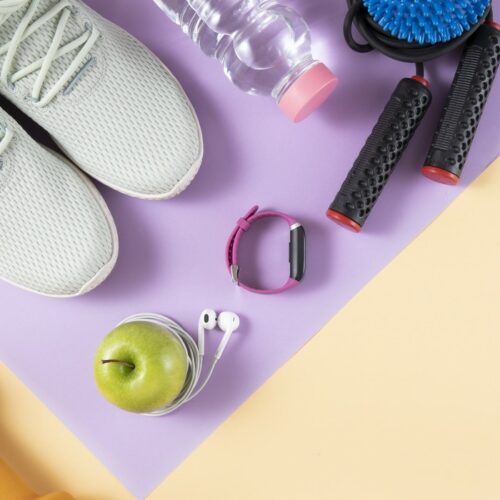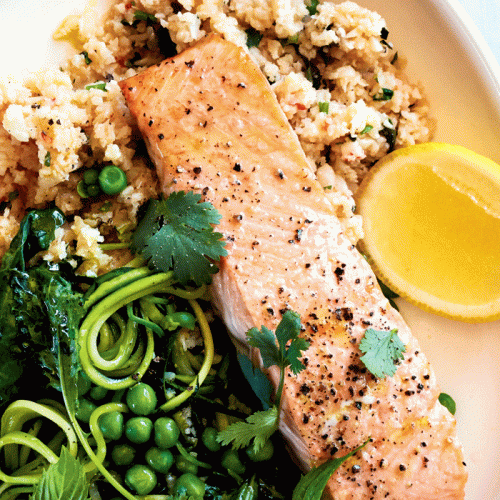
There are so many conflicting opinions about how often and how much we need to eat. Healthy Food Guide senior nutritionist Rose Carr cuts through the confusion.
Most of us will have heard advice that we ought to eat six small meals a day, or eat every two to three hours to keep our metabolism going or, even, to speed up our metabolism. Others tell us snacks add unnecessary kilojoules and we just need three good meals spaced throughout the day. Some claim eating after 6pm (or 7pm or 8pm) promotes fat storage. And you’ve probably heard the old saying, ‘Breakfast like a king, lunch like a prince and dinner like a pauper’. But what does the science say about all this?
Although there are sometimes psychological reasons for eating, such as boredom or anxiety, and sharing a meal is an important family or social occasion, our primary reason for eating is to provide our bodies with the nutrients we need. That includes the macronutrients of carbohydrate, protein and fat, as well as all the different vitamins and minerals our bodies need to function optimally.
While we talk about specific daily requirements for these nutrients, in reality we don’t need exactly the same amount every day. Our needs for specific nutrients can be evened out over a few days, or even a week. That applies to our energy intake as well. How we meet our nutrient needs, in terms of food volume and timing, naturally varies from day to day, and that’s just fine.
What happens when we eat?
After we eat we are in the fed state, which lasts for around three hours, depending on the size and composition of our meal or snack. During this time, carbohydrates are broken down into sugar molecules and our blood glucose levels increase. As blood glucose levels rise, the hormone insulin is released to help use the glucose throughout the body as well as to store any excess.
As we move into the post-absorptive state, which lasts from around three to 18 hours after a meal, there is a gradual decrease in circulating glucose. Beyond a certain threshold, our brain sends messages to several organs to produce and release hormones so we start producing glucose from our stored supplies, and to stop further insulin release.
In this way, our blood glucose levels are maintained within a specific range.
Most of us will only ever experience the fed and post-absorptive states. But, if we don’t get food for longer than around 18 hours, there are further changes to how energy is sourced and supplied to our cells and after around 48 hours without food we enter a starvation state, which is different again.
Does eating more often use more energy?
It would seem not. When we eat food, we do use some energy (kilojoules) just processing it.
Work done by our cells in the process of digestion, absorption, transport and storage of nutrients uses energy. Typically, we increase our base metabolic rate by around 10 per cent when we have a meal. This is called the thermic effect of food.
It was thought that if we ate more frequently, say six times a day rather than three, we could keep our metabolism at a higher rate, thus burn more energy and it would be easier to lose weight.
But that assumes the effect of eating a small meal lasts for as long as the effect of eating a big meal. In fact, there’s not as much work to be done by our cells when we eat a small meal. The thermic effect of food is estimated at around 10 per cent of the energy value (kilojoules) of the food. So, it doesn’t really matter how frequently we eat. If our meals are smaller, the effect will be smaller at that meal.
The thermic effect does change with what we eat, though. Protein has a greater thermic effect (20-30 per cent) than carbs, and carbs have a greater thermic effect (5-10 per cent) than fat (up to five per cent). So, swapping out a high-carb, high fat muffin for a pottle of low-fat yoghurt, with its protein and carb combo, has the potential to not only reduce the kilojoule intake, but to lessen the kilojoule impact. It’s also likely to be more satisfying for longer. A win-win.
What about the energy spike and blood glucose slump?
In healthy people, blood glucose is tightly controlled. While our blood glucose does increase after we eat carbohydrate foods, the so-called sugar-rush, or energy spike, is an exaggeration. Our bodies are designed to cope with blood glucose increasing after we eat. Similarly, most of us are unlikely to experience low blood glucose, simply because our bodies won’t allow it.
There may be some people who experience what’s called reactive hypoglycaemia, where eating or drinking a big load of quickly digested carbs, such as a big sugary drink or a huge slice of pavlova, increases blood glucose higher than the normal range. But reactive hypoglycaemia is not common and, even for people who do experience it, there are not usually symptoms. In the end, your body just runs better on slow-acting carbs, such as whole grains, pulses and fruit.
What about the time of day?
There are many observational studies showing that people who usually eat breakfast are less likely to be overweight. Breakfast eaters are also thought to have a better overall diet. The 2002 Children’s Nutrition Survey found children who usually eat breakfast at home had a lower body mass index than those who don’t. Those not eating breakfast at home were more likely to eat unhealthy snack foods, such as meat pies, confectionery and soft drinks. Remember, though, observational studies don’t explain cause and effect, they highlight things that are associated.
Although the thermic effect of eating is not huge, two small studies found that it’s greater in the morning, lower in the afternoon, and lower still at night. Another study (with 867 people) found when people ate a larger proportion of their total day’s food in the morning, they ate significantly less over the whole day. Yet, when the same people ate a high proportion of their total intake during the evening, they ate more over the whole day. Interesting stuff, but we can’t say these effects will definitely apply to you.
Arguably, the most important consideration around breakfast is what you eat. A sugary doughnut won’t add to your health or satisfy you for very long. On the other hand, eggs on toast or a bowl of overnight oats add both nutrition and satiety. There is no hard and fast rule that says you have to break your fast as soon as you’re up. Some people simply can’t face food until they’ve been up for an hour or two.
What about children?
Believe it or not, we were all born with an innate ability to regulate our energy needs. Unfortunately, it tends to get over-ridden at some stage in our lives.
Many studies have shown that when infants and children are presented with nutritionally adequate foods, while the amount of food eaten each day will vary widely, averaged out, their consumption meets their energy needs. It’s also important to remember that toddlers have small stomachs, so they need small meals and snacks every two to three hours to get all the energy they need.
Is ‘hangry’ a thing?
The evidence is slim so far, but there are some links between hunger and stress or anger. Two of the hormones released to increase blood glucose are adrenaline and cortisol and these same hormones are released in stressful situations. Then there’s neuropeptide Y, a chemical released into the brain when we’re hungry. It stimulates eating by acting on receptors in the brain, including the Y1 receptor which, along with other functions, helps regulate anxiety or anger. There are even studies that have linked self-control to blood-glucose levels, theorising that controlling our behaviour might become more difficult when we’re hungry.
While the theory is interesting, low blood sugar might not be why we find ourselves snapping at workmates. Stop and think about what else is going on. If we’re not looking after ourselves, simply eating more often is not going to help.
- Is there too much stress in my life?
- Have I had enough fluids today?
- Have I had more caffeine than my body can cope with?
- Am I getting as much sleep as I need?
- Do I get enough fresh air each day?
- Am I exercising my body?
Surely it’s not good to be hungry?
We live in an environment where food is so readily available some of us have forgotten what mild hunger is. In that case, it’s not necessarily a bad thing to get back in touch with your body and the signals it gives you. Think about a hunger scale, where at a three your stomach feels empty and the urge to eat is strong. We don’t need to go further than that to ravenous hunger, where we’re more likely to make poorer food choices.
Having said that, for some people, intermittent fasting is way of achieving weight loss or weight control and there’s some research suggesting it might even have benefits on glucose and blood lipid measures in the short-to-medium term, although longer-term studies are still needed. Fasting is also used in various religions. These fasting practices demonstrate a healthy body’s ability to manage blood glucose.
What’s best for me?
The bottom line is, we’re all different. We lead different lives to different timetables. Some of us are in bed by 9pm, while others are up past midnight. Some people leap out of bed in the morning to spend an hour lifting weights, while others sit at a desk all day doing minimal exercise.
Some very active people need to eat frequently, because the sheer volume of food and amount of energy they need cannot be processed in just three meals. For the average office worker, that’s not an issue.
If our concern is weight loss or weight maintenance, the single most important consideration is total energy intake. Eating the most food when we need it, rather than before we go to bed, is probably helpful for everyone.
While there is research around whether lots of small meals versus two or three bigger meals each day is best, according to University of Otago Human Nutrition and Medicine professor Jim Mann, “the evidence around when we ought to eat is pretty slim and not at all compelling”.
“Studies conducted by Otago University comparing nine meals to three meals a day found, when the kilojoules were the same, the number of meals made little difference,” Professor Mann says.
Where science doesn’t favour a particular direction, it comes down to common sense. The best number of meals each day is the number that works for you.
“It seems to make good sense to spread our energy intake throughout the day, and three or more meals will do that,” he says.
Article sources and references
- Amy D. Nguyen AD et al. 2012. Y1 and Y5 Receptors Are Both Required for the Regulation of Food Intake and Energy Homeostasis in Mice. PLoS ONE 7:e40191https://www.ncbi.nlm.nih.gov/pmc/articles/PMC3387009/
- Antoni R et al. 2017. Effects of intermittent fasting on glucose and lipid metabolism. Proceedings of the Nutrition Society, doi.org/10.1017/S0029665116002986https://www.ncbi.nlm.nih.gov/pubmed/28091348
- Arnold LM et al. 1993. Effect of isoenergetic intake of three or nine meals on plasma lipoproteins and glucose metabolism. American Journal of Clinical Nutrition 57:446-51https://www.ncbi.nlm.nih.gov/pubmed/8438781
- Arnold LM et al. 1994. Metabolic effects of alterations in meal frequency in hypercholesterolaemic individuals. Atherosclerosis 108:167-74https://www.ncbi.nlm.nih.gov/pubmed/7980716
- Arnold LM et al. 1997. Metabolic effects of alterations in meal frequency in type 2 diabetes. Diabetes Care 20:1651-4https://www.ncbi.nlm.nih.gov/pubmed/9353602
- Bushman BJ, et al. 2014. Low glucose relates to greater aggression in married couples. Proceedings of the National Academies of Sciences 111:6254-7https://www.pnas.org/content/111/17/6254
- Cahill LE et al. 2013. A prospective study of breakfast eating and incident coronary heart disease in a cohort of male U.S. health professionals. Circulation 128:337-43https://www.ncbi.nlm.nih.gov/pubmed/23877060
- De Castro JM. 2004. The time of day of food intake influences overall intake in humans. Journal of Nutrition 134:104–11https://www.ncbi.nlm.nih.gov/pubmed/14704301
- Gropper SS et al. 2016. Advanced Nutrition and Human Metabolism. 7th ed. Boston: Cengage Learning Johnston JD et al. 2016.
- Johnston JD et al. 2016. Circadian rhythms, metabolism, and chrononutrition in rodents and humans. Advances in Nutrition 7:399-406https://www.ncbi.nlm.nih.gov/pmc/articles/PMC4785478/
- Karl T et al. 2004. Y1 receptors regulate aggressive behaviour by modulating serotonin pathways. Proceedings of the National Academies of Sciences 101: 12742-7https://www.ncbi.nlm.nih.gov/pubmed/15314215
- Leech RM et al. 2016. Meal frequency but not snack frequency is associated with micronutrient intakes and overall diet quality in Australian men and women. Journal of Nutrition 146:2027-34https://www.ncbi.nlm.nih.gov/pubmed/27581583
- Morris CJ et al. 2015. The human circadian system has a dominating role in causing the morning/evening difference in diet-induced thermogenesis. Obesity 23:2053-8https://www.ncbi.nlm.nih.gov/pubmed/26414564
- Romon M et al. 1993. Circadian variation of diet-induced thermogenesis. American Journal of Clinical Nutrition 57:476-80https://www.ncbi.nlm.nih.gov/pubmed/8460600
- Thomson JL & Manore MM. 2007. Nutrition for Life. San Francisco: Pearson Educationhttps://www.pearson.com/us/higher-education/product/Thompson-Nutrition-for-Life-3rd-Edition/9780321774354.html
www.healthyfood.com










